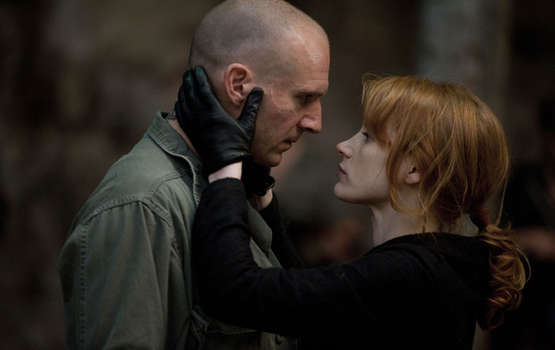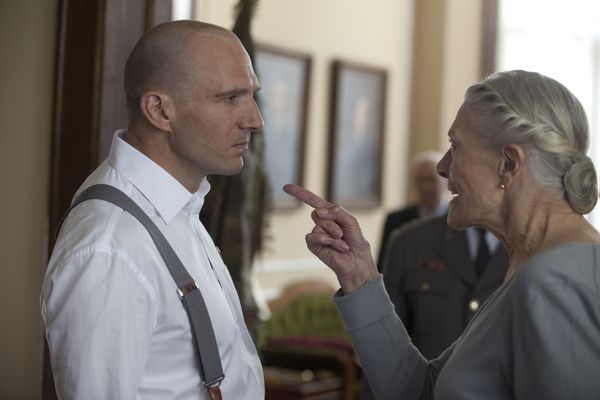|
Coriolanus
Reviewed
by
Damien Straker on
March 4th, 2012
Icon Films presents
a film directed by
Ralph
Fiennes
Screenplay
by
John Logan, based on the play 'Coriolanus' by William
Shakespeare
Starring:
Ralph Fiennes, Gerard Butler, Brian Cox, Vanessa Redgrave and
Jessica Chastain
Running
Time:
122 mins
Rating:
M
Released:
March 8th,
2012
|
6/10
|
|
This is a modern day version of Shakespeare's play that
retains
the classical language of the original production. The play is based on
the
life of the Roman General Gaius Marcius Coriolanus, the legend of whom
is still
contested by some historians. Shakespeare wrote the play in the early
1600s but
here it has been appropriated to the modern combat zone of Rome.
Coriolanus
(Ralph Fiennes) leads a group of fellow soldiers on a strike mission,
taking
down their adversaries of the state. Yet in a standoff he fails to
defeat his
main enemy Tullus Aufidius (Gerard Butler). Returning from combat and
Coriolanus is praised as a hero. Yet he upsets the public when they
believe
that he is mocking them and is sent into exile, away from his mother
Volumnia
(Vanessa Redgrave), his wife Virgilia (Jessica Chastain) and his son.

I appreciated this modern version of Coriolanus,
directed by its star Ralph Fiennes, more as a concept or
theory of appropriation than as a pure cinematic experience. This film
asks us
about timelessness and authorship but not in ways that it would ever
intend.
Choosing to set the film in modern times but keeping the Early Modern
English
dialogue is problematic. Preserving the colourful language means that
the film
is true to the play and its timeless themes but also potentially
distancing for
modern audiences too. There are some wonderful lines here like: "There is no more mercy in him than there is milk in a male tiger."
Yet if you are unfamiliar with this style of dialogue it will
challenge how
much you can invest in the story and characters. In being familiar with
some
Shakespearean plot devices, narratives and characters I was able to
access the
film but only in a broad overview of the narrative when there are
probably much
more subtle dimension to the side characters that one could miss. At
least anyone
familiar with 'King Lear' (1603) though will recognise elements like
the exile
of a leader, the failure to listen to the public because of one's
hubris and
the tragic ending. By remaining so faithful to the play Fiennes the
director,
not the actor, fails to transcend the story towards the cinematic
medium.
There's an early battle scene that is excitingly staged, without
restoring too
thickly to blood. It looks like it could be any modern combat zone and
realises
the timelessness of the play to current issues of dictatorships, which
is one
of the reasons Fiennes was interested in the piece. Interestingly, the play was banned in Germany following
the Second
World War, because it was linked too closely with fascism.

Yet despite its universal themes there are still moments
that
don't bode well to the modern period because of the emphasis on
retaining the
theatrical design. After the opening battle, the knife fight between
the two
soldiers as everyone stands around watching seems particularly
unlikely.
Similarly, as much as I'd like to see some people from TV banished, a
call to
exile from an audience watching Coriolanus in an interview doesn't fit
either
or at least seems too compressed. What remains are some incredibly long
stretches of dialogue, which are testing, no matter how much conviction
is
provided by the cast. When Fiennes resorts to more cinematic
techniques, like
tight close up shots of the faces of the actors, including an
outstanding
Redgrave, he reveals and amplifies the anger in these character and we
feel the
impact of the story. It is far more engaging than just having the
actors
surrounded by clusters of bodies, like in a play. Disappointingly, the
supporting cast doesn't match the leads because the likes of Jessica
Chastain
are underused and don't have enough to do. But if another version of
King Lear
were made, she would be a perfect Cordelia because her face is an
emotive one
of great innocence. Although you can appreciate the timelessness of the
original plays themes and its overall essence here, I think those who
are
particularly familiar with the source material and general
Shakespearean tropes
will draw the most from the film's narrative and the performances.
|